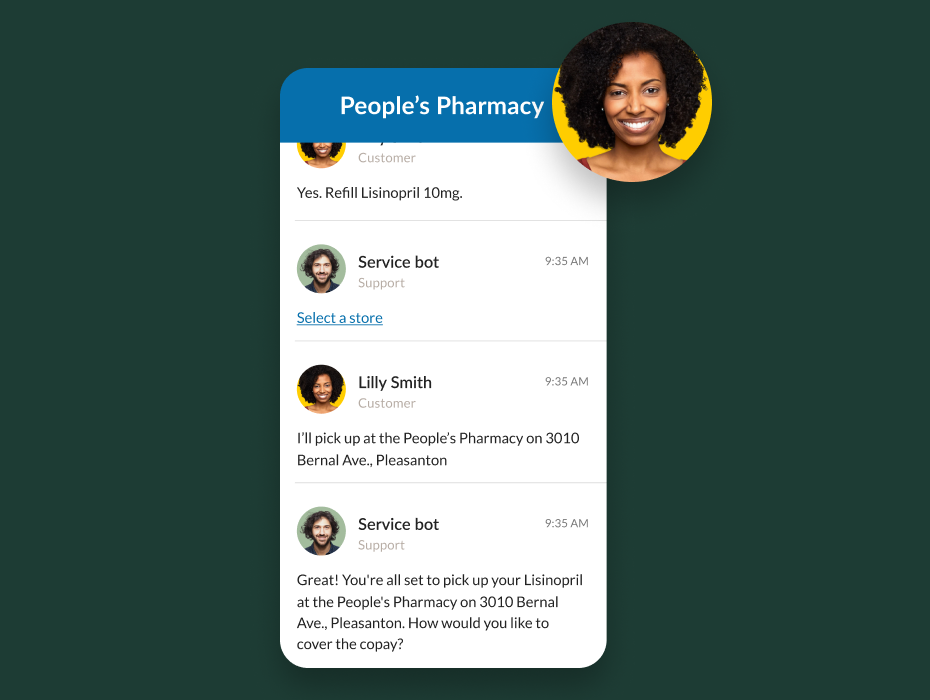AI is all the rage in sales right now, and for good reason. You’ve heard the old adage that time is money in sales. It’s true. The more efficiency you achieve across your sales organization, the more customers you can convert and the more revenue you can generate.
Artificial intelligence has been a major contributor to efforts by sales teams to improve results in recent years. Conversation intelligence software, for instance, is used to analyze interactions with prospects through text and speech platforms. AI-driven analysis is more effective at evaluating CX factors and optimizing service methods and approaches.
When you understand the role of AI in sales, you are in a much better position to leverage its capabilities within your organization.
Today, we’ll cover:
What is sales AI?
“Sales AI” refers to AI methods used to simplify and optimize your sales processes. Various types of AI driven software are now in use across sales-based operations—often used to improve the experience for customers and coach sales personnel more effectively.
AI supports both agent-based sales activities and self-supported interactions via chatbots. Sales reps benefit from the insights gleaned to improve strategies for converting prospects into customers. AI analysis of large volumes of customer interactions can improve sales and support activities by identifying areas for chatbot optimization.
Benefits of AI for sales
Companies achieve many great benefits when using AI for sales. These benefits impact the customer experience as well as the ability of your agents to manage the selling process. Key advantages include:
- Optimized sales scripts
- Improved conversion rates
- Better sales team coaching
- Live call support
Optimized sales scripts
Sales scripts are an important resource for agents as they navigate calls. Analysis of interactions with prospects provides valuable insights into the types of messaging and phrasing that works within sales scripts.
Improved conversion rates
With more insight into customer sentiment and improved sales scripts, conversion rates improve. You can more effectively home in on the right types of prospects with ideal communication strategies.
Better sales team coaching
Sales leaders can better coach agents with targeted and individualized plans. These plans are based on performance data gathered and evaluated by AI software such as conversation intelligence.
Live call support
Generative AI offers significant opportunities for live call support for your sales agents. It is able to quickly scan through customer data and interactions to gain insights. Then, Ai can serve up real-time action recommendations to agents to help deliver the right message at the right point in the call.
Examples of sales AI
Here are 3 examples of how sales teams are using AI today:
- Qualifying leads
- Sales team scripts and support
- Self-service interactions
Qualifying leads
AI analysis of prospect interactions gives your business more visibility for improving lead-based qualification. It helps you improve lead-scoring models based on analysis of interactions, prospect traits, and other factors. Improved lead scoring reduces time spent on less-promising prospects.
Sales team scripts and support
Agents benefit from improved scripts used on sales calls. Coupled with action recommendations, ideal scripts help agents say the right things at the right time based on prospect interactions.
Self-service interactions
Chatbots are a critical component of sales AI. They provide fast, convenient access to prospects who have questions. Responding quickly to prospect inquiries is important to winning customers. AI-powered chatbots can accurately identify answers to common questions and make resource recommendations.
4 ways to use AI for sales

Incorporating AI into all of these sales activities may seem daunting if your business doesn’t currently utilize AI software, but it doesn’t have to be complicated.
Conversation intelligence is a piece of the AI puzzle that can personalize every pitch and help close more deals. RingSense from RingCentral is a conversation intelligence platform that supports a multitude of capabilities for AI in sales. Here are some of the ways RingSense helps sales teams:
- Seamlessly records and transcribes phone calls & video meetings & stores them for easy retrieval afterwards. Automated note taking during meetings to focus on active listening
- Leverages AI to summarize conversations and automatically update sales CRMs like Salesforce. Automated data entry of the summaries and next steps into CRMs for better hygiene, helping with forecasting
- Delivers automated coaching tips so the team can give consistent, successful pitches. Automated post-call feedback via an AI coach so sellers can improve over time.
- Provides insights into what topics, competitors and products customers are interested in. Insights across all your customers on your competition and the common objections
Close more deals with AI from RingSense
AI is making a huge impact on sales and business in general. Leveraging AI, you can improve sales coaching, optimize conversion rates, and give customers access to more effective self-supported chatbot interactions.
RingSense is designed specifically to support sales leaders through accurate and efficient data extraction powered by artificial intelligence.
Grow your sales team through customers and tailored onboarding for new hires. Improve coaching through sales enablement features like data-driven sales playbooks and greater individual and team insights. Empower your agents with AI-driven action suggestions during customer interactions.
Continually improve the customer experience with automated buyer journey summaries that offer insight into past interactions while creating upsell opportunities. Track customer behaviors and messaging sentiment more effectively.
All of these advantages boost your sales productivity and conversion rates. AI has become the great differentiator between companies that thrive and those that lose out to more tech-savvy and innovative leaders. Embrace the capabilities of RingSense to supercharge your sales.
Originally published Oct 18, 2023, updated May 15, 2024





